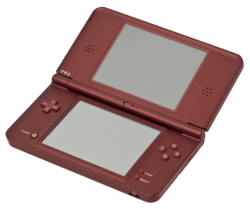DSi Shop
 |
|
| Also known as | iQue DSi (China) |
|---|---|
| Developer | Nintendo |
| Product family | Nintendo DS |
| Type | Handheld game console |
| Release date | |
| Units shipped | 28.44 million (as of September 30, 2014) |
| Media |
Physical and digital
|
| Operating system | Nintendo DSi system software |
| CPU | 2 ARM architecture processors |
| Storage | 256 MB internal flash memory SD/SDHC card (up to 32 GB) Cartridge save |
| Connectivity | Wi-Fi |
| Online services |
Nintendo Wi-Fi Connection Nintendo DSi Shop Nintendo Zone |
| Predecessor |
Nintendo DS (original design) Nintendo DS Lite (first redesign) |
| Successor | Nintendo 3DS family |

The Nintendo DSi XL's white, black, and burgundy (pictured) color schemes were intended to match with living room and dining room settings.
|
|
| Release date | |
|---|---|
| Units shipped | 12.93 million (as of September 30, 2014) |
| Dimensions (when closed) |
Length: 3.60 inches (91 mm) Width: 6.34 inches (161 mm) Height: 0.83 inches (21 mm) |
| Weight | 0.692 pounds (314 g) |
The Nintendo DSi (Japanese: ニンテンドーDSi Hepburn: Nintendō Dī Esu Ai?) is a dual-screen handheld game console released by Nintendo. The console launched in Japan on November 1, 2008, and worldwide beginning in April 2009. It is the third iteration of the Nintendo DS, and its primary market rival is Sony's PlayStation Portable (PSP). The fourth iteration, entitled Nintendo DSi XL, is a larger model that launched in Japan on November 21, 2009, and worldwide beginning in March 2010. Development of the DSi began in late 2006, and the handheld was unveiled during an October 2008 Nintendo conference in Tokyo. Consumer demand convinced Nintendo to produce a slimmer handheld with larger screens than the DS Lite. Consequently, Nintendo removed the Game Boy Advance (GBA) cartridge slot to improve portability without sacrificing durability.
While the DSi's design is similar to that of the DS Lite, it features two digital cameras, supports internal and external content storage, and connects to an online store called the Nintendo DSi Shop. Nintendo stated that families often share DS and DS Lite consoles. Its new functionality was intended to facilitate personalization, so as to encourage each member of a household to purchase a DSi. The handheld supports exclusive physical media in addition to DS games with DSi-specific features and standard DS titles. The only exception to its backward compatibility are earlier DS games that required the GBA slot. Nintendo had sold over 41 million DSi and DSi XL units combined.
...
Wikipedia
